This post has been translated into Belorussian..
Chinese medicine and herbal medicine are in the news at the moment. There is a real risk that the government could endorse them by accepting the Pittilo report.
In my view traditional Chinese medicine endangers people. The proposed ‘regulation’ would do nothing to protect the public. Quite on the contrary, it would add to the dangers, by giving an official stamp of approval while doing nothing for safety.
The government’s idea of improving safety is to make sure that practitioners are ‘properly trained’. But it is the qualifications that cause the danger in the first place. The courses teach ideas that are plain wrong and often really dangerous.
Why have government (and some universities) not noticed this? That’s easy to see. Governments, quangos and university validation committees simply don’t look. They tick boxes but never ask what actually goes on. Here’s some examples of what goes on for them to think about. They show clearly the sort of dangerous rubbish that is taught on some of these ‘degrees’.
These particular slides are from the University of Westminster, but similar courses exist in only too many other places. Watch this space for more details on courses at Edinburgh Napier University, Middlesex University and the University of East London
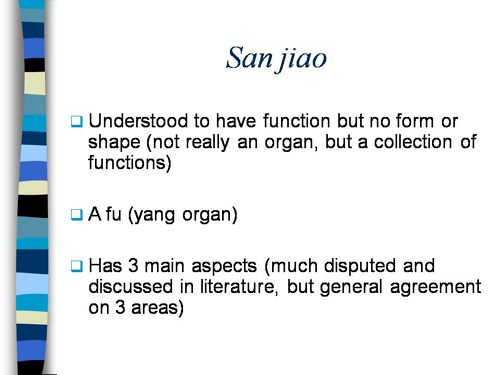
Just a lot of old myths. Sheer gobbledygook,
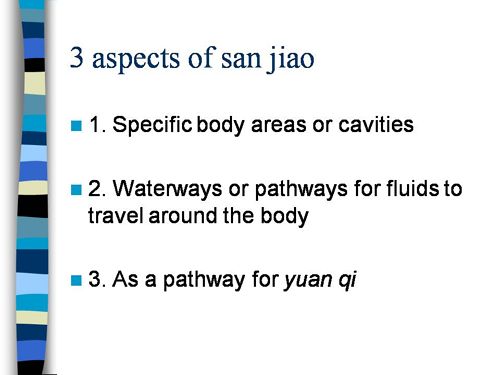
SO much for a couple of centuries of physiology,
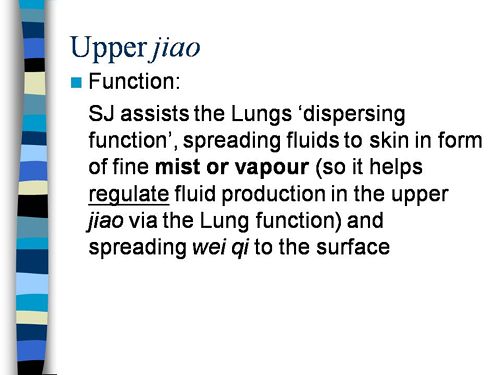
It gets worse.
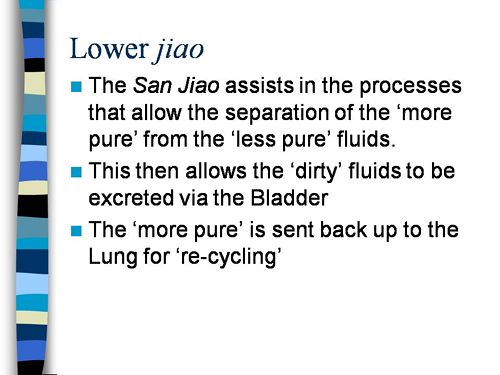
Plain wrong.
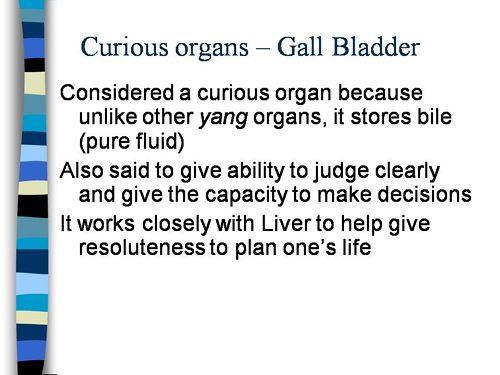
Curious indeed. The fantasy gobbledygook gets worse.
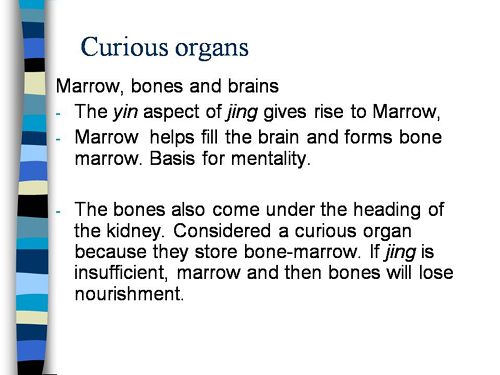
Now it is getting utterly silly. Teaching students that the brain is made of marrow is not just absurd, but desperately dangerous for anyone unlucky (or stupid) enough to go to such a person when they are ill.
Here’s another herbal lecture., and this time the topic is serious. Cancer.
Herbal approaches for patients with cancer.
I’ve removed the name of the teacher to spare her the acute embarrassment of having these dangerous fantasies revealed. The fact that she probably believes them is not a sufficient excuse for endangering the public. There is certainly no excuse for the university allowing this stuff to be taught as part of a BSc (Hons).
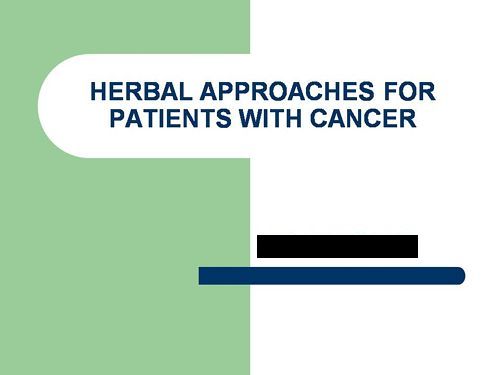
First get them scared with some bad statistics.
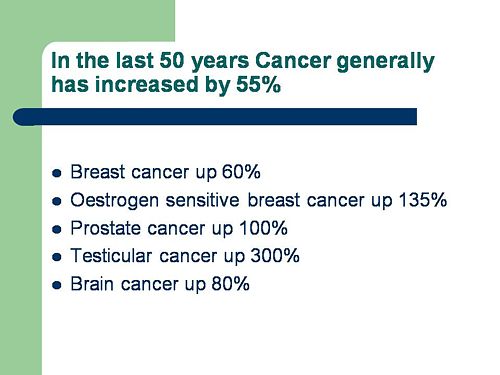
No fuss there about distinguishing incidence, age-standardisation and death rates. And no reference. Perhaps a reference to the simple explanation of statistics at Cancer Research UK might help? Perhaps this slide would have been better (from CDC). Seems there is some mistake in slide 2.
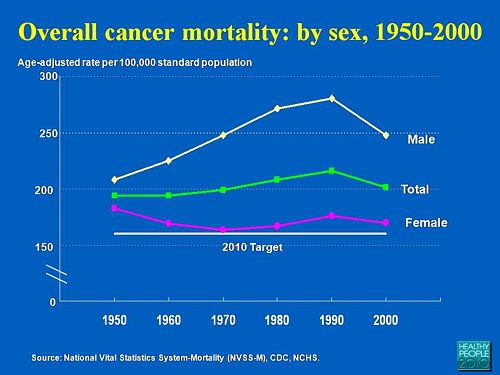
Straight on to a truly disgraceful statement in slide 3
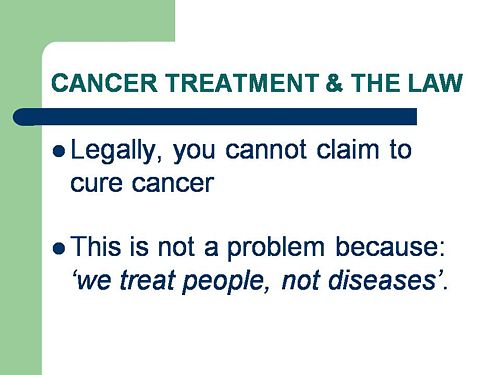
The is outrageous and very possibly illegal under the Cancer Act (1939). It certainly poses a huge danger to patients. It is a direct incentive to make illegal, and untrue claims by using weasel words in an attempt to stay just on the right side of the law. But that, of course, is standard practice in alternative medicine,
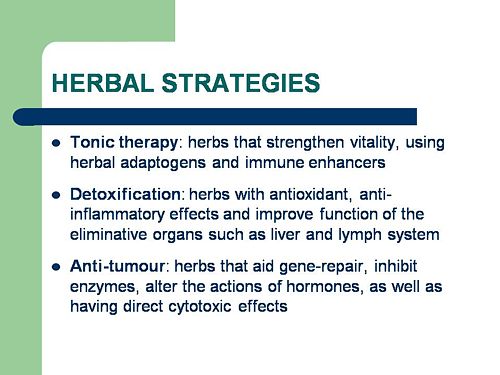
Slide 11 is mostly meaningless. “Strengthen vitality” sounds good but means nothing. And “enhancing the immune system” is what alternative medicine folks always say when they can think of nothing else. Its meaning is ill-defined and there is no reason to think that any herbs do it.
The idea of a ‘tonic’ was actually quite common in real medicine in the 1950s. The term slowly vanished as it was realised that it was a figment of the imagination. In the fantasy world of alternative medicine, it lives on.
Detoxification, a marketing term not a medical one, has been extensively debunked quite recently. The use of the word by The Prince of Wales’ company, Duchy Originals recently fell foul of the Advertising Standards Authority, and his herbal ‘remedies’ were zapped by the MHRA (Medicines and Health Regulatory Authority).
And of course the antioxidant myth is a long-disproved hypothesis that has become a mere marketing term.
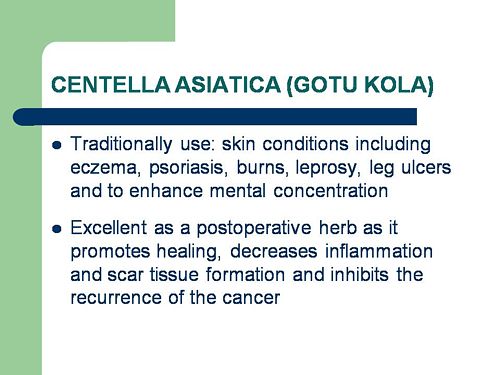
“Inhibits the recurrence of cancer”! That sounds terrific. But if it is so good why is it not even mentioned in the two main resources for information about herbs?
In the UK we have the National Library for Health Complementary and Alternative Medicine Specialist Library (NeLCAM), now a part of NHS Evidence. It was launched in 2006. The clinical lead was none other than Peter Fisher, clinical director of the Royal London Homeopathic Hospital, and the Queen’s homeopathic physician. The library was developed with the School of Integrated Health at the University of Westminster (where this particular slide was shown to undergraduates). Nobody could accuse these people of being hostile to magic medicine,
It seems odd, then, that NeLCAM does not seem to thnk to think that Centella asiatica, is even worth mentioning.
In the USA we have the National Center for Alternative and Complementary Medicine (NCCAM), an organisation that is so friendly to alternative medicine that it has spent a billion dollars on research in the area, though it has produced not a single good treatment for that vast expenditure. But NCCAM too does not even mention Centella asiatica in its herb list. It does get a mention in Cochrane reviews but only as a cosmetic cream and as an unproven treatment for poor venous circulation in the legs.
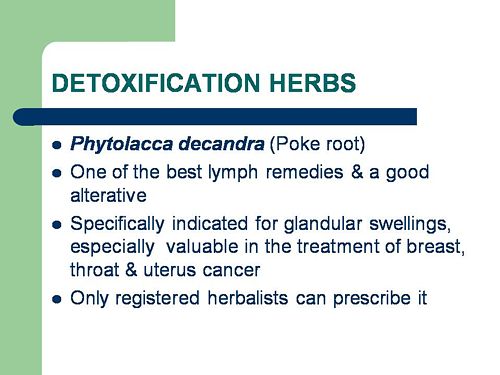
What on earth is a “lymph remedy”. Just another marketing term?
“especially valuable in the treatment of breast, throat and uterus cancer.“
That is a very dramatic claim. It as as though the hapless students were being tutored in doublespeak. What is meant by “especially valuable in the treatment of”? Clearly a desperate patient would interpret those words as meaning that there was at least a chance of a cure. That would be a wicked deception because there isn’t the slightest reason to think it works. Once again there this wondrous cure is not even mentioned in either NELCAM or NCCAM. Phytolacca is mentioned, as Pokeweed, in Wikipedia but no claims are mentioned even there. And it isn’t mentioned in Cochrane reviews either. The dramatic claims are utterly unfounded.
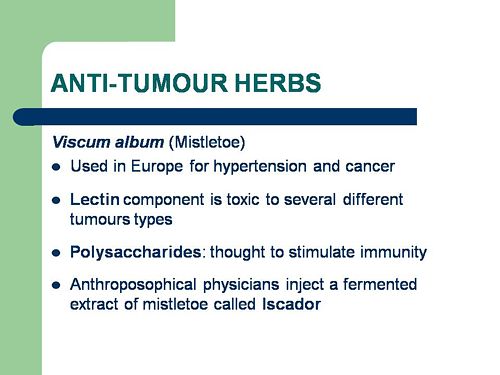
Ah the mistletoe story, again.
NHS Evidence (NeLCAM) lists three completed assessments. One concludes that more research is needed. Another concludes that “Rigorous trials of mistletoe extracts fail to demonstrate efficacy of this therapy”, and the third says “The evidence from RCTs to support the view that the application of mistletoe extracts has impact on survival or leads to an improved ability to fight cancer or to withstand anticancer treatments is weak”.
NCCAM says of mistletoe
- More than 30 human studies using mistletoe to treat cancer have been done since the early 1960s, but major weaknesses in many of these have raised doubts about their findings (see Question 6).
- Very few bad side effects have been reported from the use of mistletoe extract, though mistletoe plants and berries are poisonous to humans (see Question 7).
- The U.S. Food and Drug Administration (FDA) has not approved mistletoe as a treatment for cancer or any other medical condition (see Question 8).
- The FDA does not allow injectable mistletoe to be imported, sold, or used except for clinical research (see Question 8).
Cochrane reviews lists several reviews of mistletoe with similar conclusions. For example “The evidence from RCTs to support the view that the application of mistletoe extracts has impact on survival or leads to an improved ability to fight cancer or to withstand anticancer treatments is weak”.
Anthroposophy is one of the highest grades of fantasy you can find. A post on that topic is in the works.
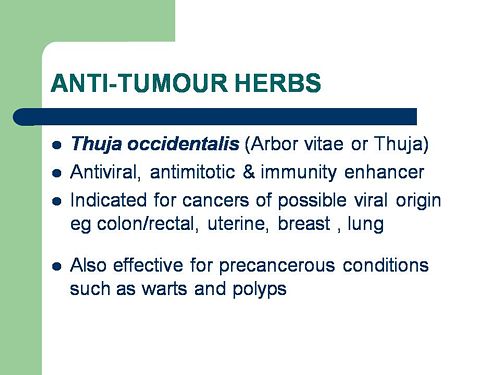
“Indicated for cancers . . . colon/rectal, uterine, breast, lung“. A cure for lung cancer? That, of course, depends on how you interpret the weasel words “indicated for”. Even Wikipedia makes no mention of any claims that Thuja benefits cancer. NHS Evidence (NeLCAM) doesn’t mention Thuja for any indication. Neither does NCCAM. Nor Cochrane reviews. That is not the impression the hapless students of this BSc lecture were given. In my view suggestions that you can cure lung cancer with this tree are just plain wicked.
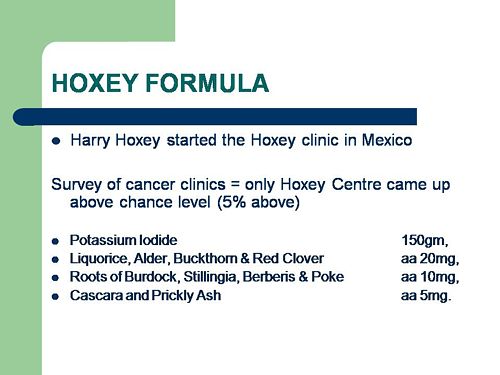
Pure snake oil, and not even spelled correctly, Harry Hoxsey’s treatment centres in the USA were closed by court order in the 1950s.
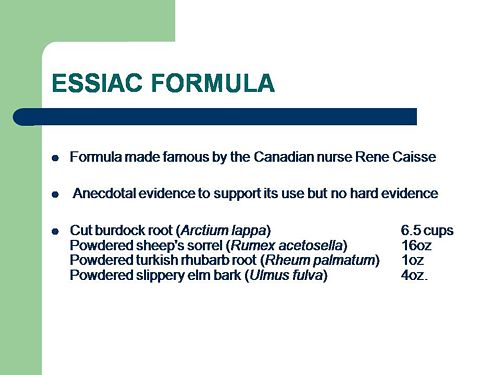
At least this time it is stated that there is no hard evidence to support this brand of snake oil.
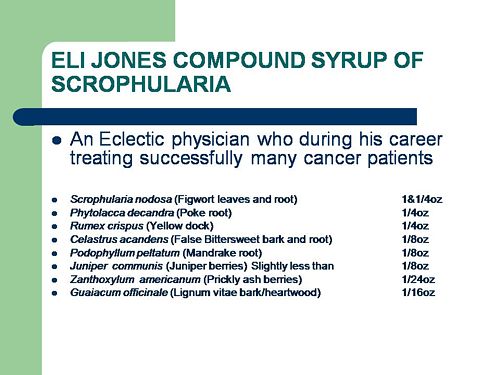
More unfounded claims when it says “treated successfully many cancer patients”. No references and no data to support the claim. It is utterly unfounded and claims to the contrary endanger the public.
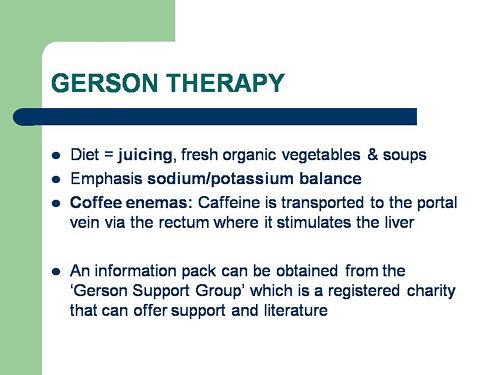
Gerson therapy is one of the most notorious and unpleasant of the quack cancer treatments. The Gerson Institute is on San Diego, but their clinics are in Mexico and Hungary. It is illegal in the USA. According to the American Cancer Society you get “a strict low-salt, low-fat, vegetarian diet and drinking juice from about twenty pounds of fresh fruits and vegetables each day. One glass of juice is consumed each hour, thirteen times a day. In addition, patients are given several coffee enemas each day. Various supplements, such as potassium, vitamin B12, pancreatic enzymes, thyroid hormone, and liver extracts, are used to stimulate organ function, particularly of the liver and thyroid.”. At one time you also got several glasses of raw calf liver every day but after infections killed several people] carrot juice was given instead.
Cancer Research UK says “there is no evidence to show that Gerson therapy works as a cure for cancer”, and “The Gerson diet can cause some very serious side effects.” Nobody (except perhaps the Price of Wales) has any belief in this unpleasant, toxic and expensive folk-lore.
Again patients are endangered by teaching this sort of stuff.
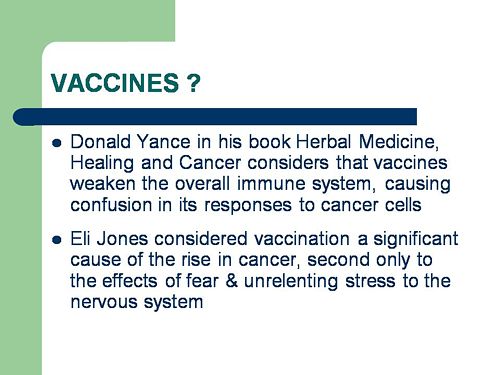
And finally, the usual swipe at vaccines. It’s nothing to do with herbalism. but just about every alternative medicine advocate seems to subscribe to the anti-vaccination lobby.. It is almost as though they have an active preference for things that are known to be wrong. They seem to believe that medicine and science are part of an enormous conspiracy to kill everyone.
Perhaps this dangerous propaganda might have been ameliorated if the students had been shown this slide (from a talk by Melinda Wharton).
Left to people like this, we would still have smallpox, diphtheria. tetanus and rabies, Take a look at Vaccine-preventable diseases.
This is the sort of ‘education’ which the Pittilo report wants to make compulsory.
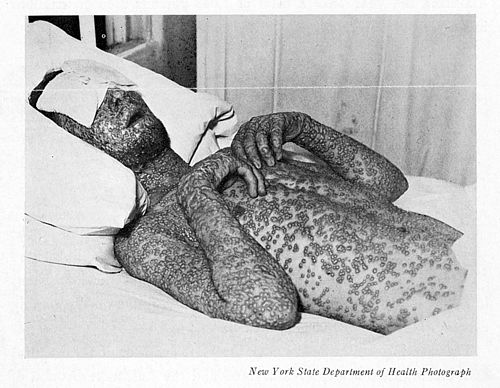
Smallpox in Baltimore, USA, 1939. This man was not vaccinated.
Conclusion
This selection of slides shows that much of the stuff taught in degrees in herbal medicine poses a real danger to public safety and to public health.
Pittilo’s idea that imposing this sort of miseducation will help safety is obviously and dangerously wrong. The Department of Health must reject the Pittilo recommendations on those grounds.

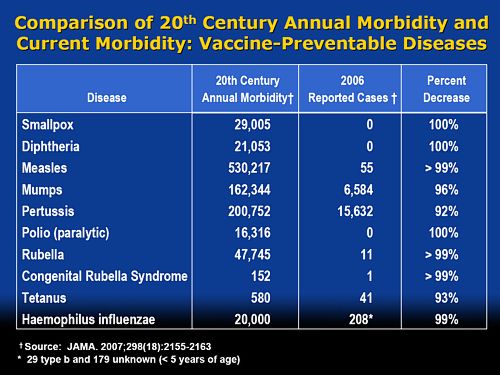

@Don
Dr Aust will doubtless respond himself about your specific question.
The is an analogy in the UK though. There is a small group of medics who practise acupuncture but renounce all the disproved nonsense and meridians and “qi” They are in the British Medical Acupuncture Society. They are not really relevant to the courses recommended by Pittilo because the courses all teach the full mumbo jumbo.
I’m touched by your faith in the judgement of “level headed medical specialists. That’s rather unusual in the alternative community. In fact your faith seems to be rather greater than mine. There were plenty of “level-headed medical specialists” who recommended blood letting in the barbarous days of medicine that existed before people demanded evidence.
physicsteacher
Yes, good questions. It does seem odd at first sight, phrased like that.
I think there are several reasons why TCM might tell us things that we don’t know.
Medicine is inseparable from culture and history and results from all kinds of intellectual trends and power and economic plays. All these affect the way medicine views health and disease and the way it treats disease – sometimes successfully, sometimes not.
physics teacher (I’m having to post this in bits as it seems to have a word limit)
Modern medicine tends to isolate phenomena in order to study them better and to isolate ingredients to make medicines that are standardised and powerful, often effective, often with unwanted (side) effects and into the bargain highly marketable for profit. Traditional Chinese medicine – deriving from a holistic philosophy – tends more to look at patterns and relationships of phenomena. So its herbal medicine, for example, works more with the complex synergistic effects of ingredients in a single substance and – even more importantly – the synergistic effect of carefully constructed combinations of medicinal substances (herbs etc.) cooked together.
sorry, this is hopeless, it just won’t accept the rest of the post (a Mac thing?)
David C
I’m afraid you’ve still not addressed this point: medics in the UK (there are quite a few of them actually), physios in the UK (lots of them), medics in Germany (vast hordes of them), plus others in France, Italy, Russia, China and many more countries, all practice acupuncture yet you say that it doesn’t work. Are you now suggesting that some sorts of acupuncture are useful but not others (evidence please)? Or are all of these highly trained medical specialists simply muddle-headed blood-letters at heart.
@Don,
It is fair to say that even highly trained medical specialists can be wrong. The best evidence tells us that acupuncture whether practised from a TCM or a “western” perspective is no more effective than sham, pretend, placebo acupuncture (whatever we wish to call it this week).
In light of this unless those medics accept that they are delivering acupuncture in order to achieve a placebo effect, which in large part I would doubt (and we could have a lovely argument as to the ethics of that position), then they are indeed being muddle headed.
It is a curious thing that once one has become enthralled to a treatment it is very hard to accept the evidence.
To give credence to acupuncture due to its popularity with people that we might respect is a case of argument from authority and is a common logical fallacy.
Doesn’t matter who believes it, if the evidence tells us different then accept the evidence.
Don,
what DC is saying is that accupunture has been shown to be a very powerful placebo. Often the more theatrical the intervention, the bigger the improvement in symptoms (this does not constitute a cure).
This has been shown numourous times is studies utilising sham accupuncuture (i.e. needles placed in incorrect positions, not inserted, toothpicks etc), in which there has been no difference between sham and “genuine” trails.
Accupuncture is a placebo intervention for self limeting conditions such as low back pain, where to use DC’s phrase, everything is as ineffective as each other.
This shows that all the mystical woo bollocks about qi meridians etc is total arse. Doctors do use accupuncture to help such conditions, however they realise that the mystical gubbins is, well, gubbins. It does not cure conditions. It may provide some short term pain relief. Thats probably the best you could say.
I work at the legendary University of Woominster and have continued to be amazed by what I see taught in the intergrated health department. I have some very amusing slides to send to DC at some point (the file is a monster and needs breaking down) about biofields, accupuncture, homeopathy etc. Now the schools have merged I also expect I will get to see some first hand teaching of some of our BSc degrees.
1. Just because Chinese medicine and crystal healing etc. are both classified as CAM, it’s simply wrong to assume they are the same in any significant way.
2. Repeating something (that there is no evidence for acupuncture over sham acupuncture) ad nauseam doesn’t make it true. There are numerous acupuncture studies published in peer-reviewed journals that show verum acupuncture to be superior to sham, and yes, there are others that show.
@peterdeadman,
It is not simply a matter of repetition. The highest quality trials show no difference between “real” and sham acupuncture. The highest quality systematic reviews do the same and only exclude poorly performed trials.
From this we can draw these safe conclusions that we repeat to your annoyance.
@peterdeadman
Thank you for your helpful reply. I can see that a field in which knowledge accumulates with time has the potential to grow in value the longer it has been in existence. So herbal medicine (Chinese or otherwise) might well be worth looking at, so long as its practitioners have systematically discarded those remedies that don’t work.
Regarding your argument that TCM looks more at patterns and relationships, whereas modern medicine tends to isolate phenomena – I’m not convinced! I don’t doubt that TCM does look at patterns and relationships, but I’m sure that modern medicine does too. What is science if not the search for patterns in nature? Tags like holism and reductionism are pretty meaningless.
It remains possible that TCM’s approach to the study of the body might have some lessons for us, although if it did I’d be surprised if doctors didn’t admit it. I remain sceptical that models with their origins in the ancient past can of themselves be directly relevant.
Thank you again for taking the trouble to reply.
physicsteacher
I actually wrote a much longer response but the vagaries of this forum software wouldn’t let me post it. I would still like to reply to you but it won’t let me post more than a few words.
Neoconnell, David C etc
To dismiss the experiences and beliefs of a multitude of patients and practitioners (including tens of thousands of medics) because ‘the evidence tells us different’ is academically naive and too selective an approach to be of practical value.
I think that Sackett’s original EBM proposal was that evidence should be combined with clinical experience in order to make clinical decisions, not that one or other should be the be-all and end-all. Also we’ve already heard that Sir Michael Rawlins was calling for a widening of the evidence base, moving away from over-reliance on RCTs or particular sorts of RCTs. There are huge observational studies on acupuncture patient outcomes (search on papers by C. Witt for example) that back up the clinical experience of the ‘muddle-headed’ doctors who practice it.
What the evidence tells you is obviously rather different from what the evidence tells me. Just to make repeated bald assertions that the evidence says this or the evidence says that is not conducive to a debate, more like marketing sound bites. Different pieces of evidence indicate different things and you should put together the whole package for consideration, which would include observational and pragmatic RCTs as well as your own favourites. Even for systematic reviews of RCTs the results will vary according to the choice of databases searched, the inclusion and exclusion criteria, the stats methods and the affiliations and inclinations of the authors. Successive reviews in the space of a few months can have quite different conclusions (see for example acu for IVF). Then perhaps the biggest effect comes with the individual baggage of the reader: thus you were interpreting the 2008 Cochrane review of acupuncture for assisted conception in a completely different way from Peter Deadman. Given that the review concluded “Acupuncture performed on the day of ET shows a beneficial effect on the live birth rate” it does seem a little churlish of you to focus only on the caveats – possibly placebo, possibly small trial numbers effect – yes, possibly, but possibly anything, that is of course all conjecture. If the review says it boosts the take-home baby numbers then surely PD can chalk one up for acupuncture without being accused of “wilfully ignoring the best evidence that’s available”. You see what I mean? Different people, different interpretations. These reviews are nearly always equivocal in what they conclude and hedge it around with all sorts of provisos. They usually end by calling for more, bigger, better trials, something which I think you oppose (though if you’re going to discount the results of existing trials/reviews on the basis of small numbers then logically you should back this call). Andrew said of TCM that the “rigorous testing has already happened”. Cochrane and other reviewers (in dreary repetition) do not agree. It seems that you may be out of step with the researchers as well as the practitioners and the patients.
Now we come to placebo and sham. Neoconnell said: “The best evidence tells us that acupuncture whether practised from a TCM or a “western” perspective is no more effective than sham, pretend, placebo acupuncture (whatever we wish to call it this week).” Unfortunately what you call it is quite important. Placebo it ain’t. The best possibility for a placebo comparison so far has perhaps been (Lewith’s?) electroacupuncture vs sham TENS. The rest are nowhere near I’m afraid, so there is no evidence to tell us how much of the treatment response is down to placebo and how much is due to all the other bits and pieces (and the interactions between them). The sham trials are usually set up to test only one or two components of an acupuncture treatment (and often not designed properly to allow even that) not the whole package. Typically this would be the needle location and the nature of the needle insertion. In effect you are often just comparing one type of acupuncture with another – certainly not with a placebo. [Paterson and Dieppe (2005??) have written eloquently in this area; also MacPherson in a very recent BMJ editorial]. Various trials have shown different values for the sizes of these acupuncture effects – and this seems to vary depending on the condition you’re studying. Hence the precise needle location may be more important in nausea than it is in migraine, for example.
Migraine is actually a very interesting case: refer to the 2009 Cochrane review. This found no significant difference between true and sham acupuncture but that both were significantly better than standard prophylactic medication, in terms of number of days with headaches. So if you read this as indicative that acupuncture is all placebo what does it say about the orthodox medical treatment? If you accept that things are more complicated than that then you might consider the reviewers’ conclusions: “AUTHORS’ CONCLUSIONS: In the previous version of this review, evidence in support of acupuncture for migraine prophylaxis was considered promising but insufficient. Now, with 12 additional trials, there is consistent evidence that acupuncture provides additional benefit to treatment of acute migraine attacks only or to routine care. There is no evidence for an effect of ‘true’ acupuncture over sham interventions, though this is difficult to interpret, as exact point location could be of limited importance. Available studies suggest that acupuncture is at least as effective as, or possibly more effective than, prophylactic drug treatment, and has fewer adverse effects. Acupuncture should be considered a treatment option for patients willing to undergo this treatment.” Mmm, what are these authors of a high quality review doing recommending acupuncture? It’s also worth noting here that it took more time and more trials completed since their previous review in order to be able to come to firm conclusions – the nature of the evidence changes over time and in most areas we need a lot more of it.
The same Cochrane group produced a review on tension-type headache in 2009. This looks even better for acupuncture in that the verum group outperformed the sham control by a small but statistically significant amount (the comparison against conventional care was difficult because of poor quality of the trials, but did appear to favour the acupuncture). Again it was found that the accumulating numbers of trials allowed the drawing of significant conclusions where none were previously possible.
Of course I have been cherry-picking in terms of conditions – but then there are very few with substantial numbers of RCTs published in the West. You can find similar sorts of data for chronic back pain, arthritis, neck pain and nausea/vomiting. On the whole – and this is a broad generalisation – acupuncture comes out similar or slightly better (non-signif) than sham, similar or a bit better than conventional treatment, much better than a waiting list control and distinctly useful as an adjunct to conventional. Interestingly there is a trend for the acu results to be getting slightly better in the reviews over time, which may just be accumulating numbers making it easier to get significance. Of course there is also much observational data in these areas in support of acupuncture. ALso there is supportive cost-effectiveness data for all of the above conditions except the nausea (where I don’t think it’s been looked at).
PS. It’s not all bad: very much support your pro-NHS blog David
Don
I can see that it is going to be impossible to persuade you of the value of the proper interpretation of evidence, I suppose that is not really surprising because to do so might rob you of your livelihood and that is a lot to ask of anyone.
I’m happy for people to look at the slides and decide for themselves and to decide if it is sensible to teach students about “anti-tumour herbs” as though there were some secret cure that wicked people had been concealing from them. In my opinion it is dangerous, cruel and probably illegal.
You haven’t tried to persuade me David, quite the reverse: I’ve tried to persuade you. Your only response to my exposition on the proper interpretation of evidence, complete with data and discussion points, is a personal dig about my (supposed) livelihood. I realise that you don’t know the acupuncture research data very well, no reason why you should, and I can make allowances for that, but you make no attempt at all to address the issues raised.
I’m happy for people to look at the evidence and decide for themselves whether it is sensible to dismiss acupuncture as something that “doesn’t work to any useful extent”
Don
Acupuncture is primarily used by conventional doctors to treat conditions involving chronic pain. Chronic pain has a massive psychological / subjective component, as I am sure you know. So it is an area where “placebo treatments” might be expected to have the largest effect in susceptible individuals.
The key to understanding what is going on here is nicely summarised by James Matthew May in his first response to the recent silly BMJ editorial:
(italics mine)
The meaning of my earlier comment about the German MDs is that I suspect quite a lot of them are well aware that acupuncture is thinly supported by RCT evidence and is most likely “working” via psychology, cultural meaning, expectation etc.
Now, there is a debate to be had in medicine about precisely what the place of such things is, absent any demonstrable efficacy. But it is impossible to have this debate when advocates of CAM simply refuse to discuss what they do in this context because, quote:
– unquote.
The worst offenders in this respect by a distance are the homeopaths – sadly including, to their great discredit, the medical ones at the Faculty of Homeopathy.
Now, like James May and DC, I think that it is important to be clear about the difference between efficacy and “pragmatic usefulness”. Personally I am not desperately bothered by a dollop of complementary therapy if the distinction between “real” and “metaphorical” is clear, and if the person applying the intervention actually has the training and evidence tools to be able to understand the difference.
I would optimistically like to believe that a fair number, though not all, doctors who use complementary methods fall into this category.The medical homeopaths seem to be an exception, as do some of the more CAM-crazed types, notably the Prince of Wales’ various groupies. But for those that simply haven’t thought hard about it, at least there are people in medicine like James May, Edzard Ernst and Euan Lawson – not to mention DC – who are there to highlight the issues.
In contrast, most lay complementary therapists, though not all, cannot tell the difference. They are not even prepared to discuss the issues, and simply make the jump to:
This is, in my view, a dangerous self-deceptive trap. Some mainstream practitioners doing acupuncture slide into it. But most alternative practitioners dive in headlong.
The splash you can hear when they do is the reality being rapidly displaced.
Dr Aust
Thanks for that really excellent. summary. I too was deeply impressed by James May’s comment in the BMJ. He put very well some ideas that I have subscribed to for ages, but not formulated as articulated as well as he does. I’ll reproduce his comment in full in case people didn’t follow the link.
@ Dr Aust & David Colquhoun
Don has made very good and important points, which neither of you have responded to.
At a higher order of processing, individual research studies need to be evaluated. Both Dr Aust and DC agree with this, but merely quote the evaluations of groups who have a certain opinion about criteria to adopt in those evaluations. There are other interpretations that they ignore.
The point Don made was that it isn’t sufficient to merely quote one line of interpretation as if though it’s sacrosanct. In proper, rigorous discussion, one must come back to primary evidence, and discuss that.
Any other approach is dogmatic in nature, and not properly scientific.
[…] of Medical Herbalists (NIMH). And, as David Colquhoun points out, herbalist degrees show an imaginative approach to facts and evidence that creates a danger to the […]
There are a number of hidden assumptions in the anti-Chinese-medicine arguments above. Because the scientific view is the orthodox one, the arguments appear reasonable to the average eye. However, unless these assumptions are verified, the arguments are weak and the culture they arise from must rely on its power to enforce the corresponding beliefs (if the conclusions drawn do not correspond to reality).
Some often held assumptions are;
1) that the scientific method is the only means of ascertaining truth.
this is a philosophical belief and is not proven scientifically.
2) that control trials are the only way of deciding whether medicine ‘works’.
3) that the ‘placebo effect’ is somehow easy to procure .
4) that, with enough time, effort or money, control trials will give us enough pharmaceuticals to do away with the need for other types of medicine.
5) that some of modern medicine’s big successes point to a similar general success level for dealing with suffering and illness.
6) that the exotic symbolic langauge of Chinese medicine is evidence enough for its falsity, and that modern medicine does not share this trait for matching symbolic language to human physiology and illness.
7) that current pharmaceutical interventions follow a clean logical progression from knowledge to theory to design to therapuetic effect (rather than including a catalogue of accidents and poorly understood effects).
(8) that designing generic drugs to address the same disease in vastly differring individuals is a responsible therapeutic approach and that tailoring medicine to the individual, as exemplified by good Chinese medical practice, is some kind of evidence-base get out clause (as opposed to a an exciting ideal that will struggle to appeal to a pharma-business that thrives on producing identical interventions).
Unless these, and many other assumptions, are faced honestly, the reasoning is not well rounded in the arguments that ensue.
Iain
Thanks for your contribution, but I fear that your arguments only serve to show once again the paucity of the case for TCM
(1) What is the alternative to the scientific method? Guessing? Divine intervention? Mystical revelation? All that is meant by the scientific method is that you look to see what happens and that you make attempts to work out causal relations,
(2) This point shows that you have not understand at all the major problem of causality (Try this for an example that does not involve quackery)
(3) Irrelevant. Nobody said it was
(4) Again nobody says that, so irrelevant. Non-drug treatments are considered to be very important in some branches of medicine.
(5) Nothing could be further from the truth. Everyone agrees that there are large and important areas than medicine cannot help with (but at least you admit that there are some where it can). It is the powerlessness of medicine in some areas that drives desperate patients into the hands of quacks They are then relieved of their money, but not usually relieved of much else.
(6) “Exotic symbolic language” is not a substitute for plain English and logical thinking. Only postmodernists (and TCM advocates) think otherwise.
(7) Nobody in pharmacological research imagines for a moment that “pharmaceutical interventions follow a clean logical progression”.
(8) If this means that molecular biology (not TCM) has shown the origins of many diseases to be very complicated, and diagnostic categories to be often oversimplified, than this is a standard truth of current medicine and owes nothing to TCM. That is why one hears so much talk about genomic medicine. though with little success so far. But there isn’t the slightest reason to think that the TCM version of tailoring treatments to the individual is any more than make-believe.
Perhaps I should send you a copy of my Paton lecture when I get round to writing it up, It will address many of these questions.
Dear David
I don’t believe I presented any arguments there, just tried to point out some of the more problematic philosophical beliefs that you, and others who argue with you, have taken for granted. I fear your dismissal of them is too rapid and easy to indicate that you can see what is at stake.
“(1) What is the alternative to the scientific method?”
You have begged the question although we haven’t defined what the ‘scientific method’ is exactly. Would generations of hundreds or thousands of people ingesting a herb and observing its effects on thousands of patients, and slowly building up a working knowledge of its effects constitute a scientific equiry? Their work was far too epic to ever be repeated in some sort of trial.
“(3) Irrelevant. Nobody said it was”
But people do assume it is, don’t they? Imagine trying to set up a clinic using the placebo effect to get people better – you’d end up going mad.
“4) Non-drug treatments are considered to be very important in some branches of medicine.”
That’s true. So why is acupuncture judged using a method suitable for testing pharmaceuticals? It’s inappropriate.
“5) It is the powerlessness of medicine in some areas that drives desperate patients into the hands of quacks They are then relieved of their money, but not usually relieved of much else.”
As we are talking about Chinese medicine, do you believe noone in China was ever cured of a disease medically until about 1950? If so, have you looked into it or does it just suit you to believe that?
“6) “Exotic symbolic language” is not a substitute for plain English and logical thinking.”
But translating modern terms would show we use chemotherapy to treat ‘crab’, or that ‘pelvic inflammatory disease’ means ‘washbasin bursts into flames disease’. Why would a stranger not think this medicine is as stupid as it sounds?
“(8) If this means that molecular biology (not TCM) has shown the origins of many diseases to be very complicated, and diagnostic categories to be often oversimplified, than this is a standard truth of current medicine and owes nothing to TCM. That is why one hears so much talk about genomic medicine. though with little success so far. But there isn’t the slightest reason to think that the TCM version of tailoring treatments to the individual is any more than make-believe.”
This statement is riddled with problems. There isn’t the slightest reason to suggest ‘genomic medicine’ is anything but a make-believe dream! It doesn’t even exist yet and you have prejudged it to be superior to a system that takes the complex system as its starting point. Many scientists take a far more sympathetic view of the potential of Chinese medicine in the study of complex systems, and have actually looked into it.
Your own faith in science is not shared by a multitude of patients, weary of toxic interventions that don’t address their problems. They’re not stupid, and they have made themselves guineapigs for an experiment which has had a very poor success rate for many very common illnesses. That’s the only reason there exists a Chinese medicine community in this culture.
(This doesn’t mean that these same patients are not thankful for the benefits of modern medicine, but they are learning to be discerning.)
regards
Iain
OK I’ll try again
(1) For a good description of the scientific method I recommend Robert Merton. In 1968 he said
It is precisely this critical self-appraisal that is absent in alternative medicine.
(2) I notice that you ignore entirely my point about causality, but that is the most important point of the lot.
(3) There isn’t the slightest problem in setting up a clinic to get people better with the placebo effect alone. Homeopaths make their living that way.
(4) The sort of experimental designs that must be used to establish causality have nothing to do with pharmaceuticals. They were developed in fir first place in the 1930s for agricultural experiments and the principles are universal. Try Fisher’s 1935 book, The Design of Experiments if you wish to learn something about the topic.
(5) I didn’t say that nobody had been cured, Some Chinese herbs contain useful ingredients. Ephedrine and artemesinin come to mind. But they are not safe to use in the hands of TCM practitioners because of the unstandardised dose that is given.
(8) I’m afraid your reading is very deficient. There have been some promising starts in genomic medicine, of which breast cancer is perhaps the best example.
As I said, it has all turned out to be more complicated that one had hoped at first, and a great deal more work needs to be done. That is a sign of the critical self-appraisal which is so lacking in TCM.
Perhaps what is more irritating than anything else about alternative medicine advocates is that they sit on the sidelines, carping about ancient wisdom (most of which is wrong) while others work as hard as they can trying to solve difficult problems.
Going to the moon was childs’ play compared wit the problems of cancer. The fact that TCM practitioners regularly (if illegally) claim to be able to cure it is a cruel deception.
Critical self-appraisal is absent in dishonest people, the likes of which exist in all fields.
I did look at your causality link and it is an example of how backward biomedicine is in its understanding of the causal links between food and health. Advice from doctors about food is, for the most part, useless. Only this week my uncle, who has bowel cancer and is underweight following an operation, was told to go home and eat plenty of fish and chips and mars bars. Apparently he considered this to be insane advice. If it were a homeopath who’d advised him of this, we’d probably all be calling him a quack.
If you were lost in the outback, you’d be lucky to be rescued by an ‘aborigini’ who would have a working knowledge of nature that was almost entirely comprised of traditional, trial and error knowledge – not a hint of science.
If you wanted to eat the finest souffle, you would be better in the hands of a master chef than at the mercy of a scientist with a recipe book. The chef has amassed his knowledge by different means, luckily for us.
If you want to know how to eat a healthy diet, you will probably have a very long wait if you are going to rely on ‘science’ to inform you. Scientists have the wrong starting point for working it out – you’d be better off listening to your grandmother.
Iain
Funny, I thought my post was about how little we knew about diet and health, largely because of the problem of inferring causality.
After you last homily, I think I can rest my case.
Just shows how this method of arguing rarely leads to any new understanding – it usually disintegrates into entrenched point-scoring, or both sides just ignoring each others’ points, where the real issues are sidestepped for fear of losing the argument.
Iain @ 122 (8) “There isn’t the slightest reason to suggest ‘genomic medicine’ is anything but a make-believe dream!” As well as the breast cancer example cited by DC @ 122 (8) above gout is another example of promising genomic medicine. Veronique Vitart’s MRC Human Genetics Unit published results in Nature Genetics. They identified a gene, SLC2A9, which predisposes/causes gout. Also, we have a good proposed mechanism for the SLC2A9’s actions on proteins. Together, this explains how the high levels of uric acid in the blood plasma come to occur. In turn the uric acid precipitates the very painful attacks. Given proper research funding and enough talented scientists better prevention and treatment of gout is in sight. Details are on the NHS Choices web site http://www.nhs.uk/conditions/Gout/Pages/Introduction.aspx Much more than a make believe dream.
I noticed Niels @ 53 above linked to alleged +ve TCM gout treatment evidence (page 10), including “Blood pricking acupuncture better than allopurinol :- 60. Li ZW et al. [Controlled study of gouty arthritis treated with blood-pricking acupuncture.] Chinese Acupuncture and Moxibustion, 1993, 13(4):179–182 [in Chinese] “ This study claims to show that blood pricking acupuncture has better patient outcomes for gout AND lowers uric acid levels when compared to allopurinol patients! Allopurinol is a very effective preventative medicine that unfortunately boosts uric acid levels when first taken. In rare cases this can cause an attack. I want to know if the researchers allowed for this short term boost (worth it for the long term preventative benefit) Indeed were the same benefits seen after six months or a year? 10 years? The blood prickers may suffer again and the Allopurinol takers may suffer no more. However, I can’t read Mandarin! Anyone know of an English translation ?
Anyway, how does the blood pricking acupuncture work when it reduces the uric acid level? Gout sufferer’ s uric acid levels fall after an attack anyway. The reduction might have been normal.
Neils@92 I have no TCM qualification at all. 12 hour days delayed my answer for which I am sorry.
Iain wrote:
Hmm Allow me to attempt a translation of the doctor’s words for you:
“Eat the things you especially enjoy, treats, if you like, preferably high-calorie stuff as you need calories. No need to worry about perceived “healthy” and “unhealthy” foods right now, as getting calories in and re-gaining weight / strength post-op is what is most important.”
Now, there seems to be some mis-communication in what you say about your uncle and his doctor, but it is not “insane” advice if what your uncle needs is fast calories. If peoples’ appetite is poor, then telling them to eat their favourite foods is one way to encourage them to eat.
Of course, if your uncle would never touch fish and chips, or a Mars bar, in a month of Sundays then it may not have been a helpful way to express it, though it would doubtless have hit the spot message-wise for other people. A lot of doctors would probably have asked “What are your favourite foods?” and then offered the same “consume calories” advice based on what the patient tells them.
As to whether a homeo offering the same advice would be a called a quack; it would depend on the condition of the patient and what kind of nutrition they therefore needed.
But I would also note a key difference; the doctor has many years of training, and no doubt a lot of experience of cancer patients and their needs and habits. In contrast, the homeopath believes you can make “remedies” out of diluted bits of wrecked ships, and that diluting something makes it more potent. And s/he also knows nothing about physiology or medicine.
I know which one I’d rather take advice from.
I would add that it would be helpful to have references to back Iain’s statements
“…..how backward biomedicine is in its understanding of the causal links between food and health” and “Advice from doctors about food is, for the most part, useless”.
I do not consider that his uncle’s experience constitutes evidence that could lead to any sort of generalisation, not least because, as Dr Aust has so succinctly pointed out, such statements are open to interpretation.
quoting Dr Aust
“Hmm Allow me to attempt a translation of the doctor’s words for you:
“Eat the things you especially enjoy, treats, if you like, preferably high-calorie stuff as you need calories. No need to worry about perceived “healthy” and “unhealthy” foods right now, as getting calories in and re-gaining weight / strength post-op is what is most important.”
This is a statement that is based on the knowledge of your paradigm. What’s perceived as healthy in the situation is the calorific content of the food. Nothing else. Fish and chips and Mars bars are simultaneously blamed for various problems in the Scottish diet, for example. Just because the surgeon has experience of recommending such foods doesn’t mean we shouldn’t be critical does it, or does he get let off because he’s a surgeon?
Is it only a question of calories? Calories are calculated by buring a food stuff and seeing how much energy is produced. This satisfies some people as being scientific and therefore repeatable and reliable in some way. But is burning food a sophisticated way of understanding its effects on a human being?
If you just take a step back and think about that for a moment, it is not difficult to see how other cultures have developed far more sensitive understanding about food and its effects, its qualities, its relationship with the seasons and environment. This knowledge comes out of time and is accumulated and maintained in ways that have allowed the human being to prosper and succeed in vastly different settings.
Underweight patients are routinely advised to eat McDonalds burgers to promote fertility as a result of the same type of one dimentional thinking that constitutes ‘knowledge’ about food. We can go round in circles about ‘evidence’ and the methods for finding it in this blog, but it would be more honest to admit that the biomedical paradigm is not that interested in health. The surgeon does good work within his limits of operating on diseased bowels, but he doesn’t really spend much time looking for causal links between food and a healthy bowel because it’s not his priority.
The argument rumbles on without any acknowledgement that other cultures may have developed valuable knowledge about the health promoting qualities of food (or anything else) by means other than the scientific method.
And if you ask for the ‘evidence’ to back up that last criticism, do you not see the constipated, self-contradictory problem that lies therein?
Iain
What the *!!* are you on about?
The point of the doctor’s advice is not that it is:
– but that it is based upon his knowledge of physiology (which is a real science of understanding the body based on experiments, not a load of mystic claptrap and hand-waving), and of pathophysiology, and of how those things “work themselves out” in the context of human beings generally (medicine), and specifically of bowel cancer patients, and of that patient in particular (hence the advice often starting with the question “What are your favourite foods?”).
There is plentiful evidence that eathing a fruit- and veg- and fibre-rich healthy diet helps reduce someone’s lifetime risk of bowel cancer. Hence GPs and other people in the heathcare system routinely advise patients accordingly, in a preventive way – one of those places where nutritionists and doctors may well be recommending the same thing.
Of course, they cannot make the patients listen.
[And note that the GP, unlike the Nutritionista, will not be trying to flog you loads of over-priced supplements that you don’t need in order to increase their own income.]
However… for an underweight post-op patient, who is probably debilitated by the cancer and by the operation, and whose appetite is likely rather poor, the overriding physiological and medical priority is to get calories in and help them get their strength back, not **!* about with complicated healthy eating advice.
Later on, once a patient has regained some weight, is over the operation and is generally feeling better, would doubtless be the time to talk “healthy diet” – because the immediate physiological need has then been addressed, so now other less acute things can be tackled. Such advice might come from the surgeons, though far more likely from a specialist nurse or even a dietician as part of a “bowel cancer team” – but equally such advice might come from a patient’s GP, given GPs’ long-term (and hopefully trusted) relationship with patients.
In any case, asking the question “will a healthy diet prevent bowel cancer recurring?” is a quite different question from “will eating a healthy diet lower my lifetime risk of bowel cancer” – this is the difference between what doctors call “secondary prevention” (recurrence) and “primary prevention” (avoiding it to start with). You actually need a study to see if what works for one works for the other – though not, of course, if everything you “know” is based on the proclamations in books by smiling clowns like [insert name of celebrity nutritionista of choice].
Anyway, to repeat, the difference is that the surgeon understands some physiology (I fervently hope), some medicine and surgery (I’m sure) and his cancer patients (if he is a good surgeon).
In contrast, you have just proved you understand none of these things.
Finally, your statement:
– has to be one of single stupidest things I have ever heard an Alt.Reality fan say, even in several years on the blogs. To take but one example, the Cancer Research site on bowel cancer is chock-full of diet advice, both in terms of cancer risk and prevention, and in terms of eating after treatment (including surgery).
Iain: I’m sure that if I ate fish and chips and Mars bars I’d put on weight. It seems like a perfectly reasonably diet to help someone to gain weight quickly in a short time; it’s certainly not “insane”. There may be diets that will also lead to rapid weight gain whilst providing a full range of vitamins and minerals, but for a short time does it really matter?
Also, stop this “other cultures” nonsense. There’s nothing western about modern medicine or modern science: end of story. Whatever its historical origins, the idea that you can find out about nature by doing experiments and being honest about the results has swept the world like wildfire, not least because it works.
Of course an Australian aborigine could survive in the outback far better than I could: so what? No-one would argue that people knew nothing before the arrival of modern science, nor that a knowledge of (for example) quantum mechanics automatically gives you wilderness survival skills. If your point is that we shouldn’t automatically dismiss knowledge from pre-scientific cultures, then I’d agree completely. But the aborigines’ survival skills are different to TCM: the former clearly worked, while the success of the latter is generally less clear. Notice that people don’t say this because they see China as primitive; they say it because they don’t see the evidence for it. Asking for evidence is not showing a lack of respect for traditional cultures: it’s just common sense, whatever your background.
In any case, the “trial and error” approach that you ascribe to the aborigines sounds perfectly scientific to me. What do you think “science” means?
physics teacher
The point was that it seemed insane to my uncle, as many medical things do to many ordinary people when they are patients. You have pointed out that there is a logical reason for giving out that advice, that it is logically consistant with current scientific knowledge and is not irresponsible advice given those conditions, which I would say is true. Still, the astonishment felt by someone on the recieving end of that advice is interesting isn’t it?
My last post was filled with assertions and beliefs that cannot be taken as being based upon clear evidence and really have no place in a reasoned debate. The problem is, there isn’t really a reasoned debate occurring here. It looks on the surface of things like a reasoned debate between intelligent people, exchanging ideas and arguing what they believe is true with some good logic, but its not actually getting anywhere.
Just because a belief system is logically consistant doesn’t mean it can’t cut itself off from reality, partially or otherwise. ‘Scientism’ is a philosophical, not scientific, belief that the scientific method is all that’s needed to judge what is true in nature. Those who stand within that viewpoint are able to dismiss the views of all outsiders, who believe differently, in a very logically consistant way.
In a posting above, DC dismisses the outsiders as being post-modernists. I don’t think you have to be a post-modernist to hold the valid supposition that scientism may not be true and is not proven to be true. Even if you are, I have not seen anyone prove that post-modernism is an invalid philosophy, by scientific or other means.
So there is no real conversation happening. Many doctors and other scientists are students of Chinese medicine and have their reasons for finding it to be a convincing and rewarding study. They have found ways to either suspend their judgement or rationalise the problem of competing paradigms while entering into a meaningful study and practice of the tradition. Most practitioners of Chinese medicine know science far better than the experts of scientism know TCM.
In the future, biomedicine will either
a) solve all of mans physical and psychological ills
b) continue to have great successes and great failures
It is conceivable that characters like DC and their institutions will succeed in eradicating any competing worldviews by using their political and financial influence. In such a scenario we will either be
a) hugely grateful, or
b) worse off
Iain
The word science just means knowledge. It isn’t a ‘world view’, it is just people trying to find out what’s going on, as best they can.
I don’t even know what ‘scientism’ means. It seems to be a term of abuse that is used by alternative medicine apologists as a substitite for producing evidence.
Many of the problems are very difficult and they certainly will not all be solved in my lifetime or yours. Your contention that we’d be worse off because we can’t solve all problems makes no sense to me at all.
It is also odd that ‘alternative world views’ seem to be common in medicine but almost non-existent in chemistry and physics. I notice that Iain is happy to use email and the internet, and, very probably his car and mobile phone. He isn’t demanding that we stop suppressing ‘alternative physics’.
Just because a living being is more complicated than a mobile phone, and it therefore takes longer to find out how it works, does not seem to me to be an adequate reason to stop trying, by invoking altermative medicine.
it is really like saying, I can’t understand everything so I’ll just say it’s magic. It is giving up.
To imagine that you can help anyone by doing that seems to me to be dangerous arrogance. In contrast, it is surely better to say, as I so often have to do, that I don’t know.
David
I think your last post is covering the ground that would be a useful starting point for a meaningful discussion – trying to identify the first priciples of the debate. I think what you have said is riddled with problems that would take pages to start sorting out.
The doctors or scientists who do study TCM on its own terms with genuine interest do not share your position in relation to those first principles. What they have chosen to do is not ‘giving up’ or turning to magic, as your bias leads you to imagine, but looking deeper or wider into the human ability to rationalize and organize its attempts to help those who suffer.
When you say that a human being takes longer than a mobile phone to work out, you are again implying that time is what’s needed. Other people have decided that a different approach is what’s needed. It could be that studying Chinese medicine would speed up the process we all desire, but you’ll never find that out if you demand that TCM proves itself on terms that are inextricably linked to the system with the shortcomings we are trying to overcome. That is the contradiction that seems the most absurd to those who know something about TCM and know how it is not done justice by control trials.
Using the term ‘scientism’ is not intended to abuse but to identify the nature of your beliefs. You may not consider that a detail worth noting, but those who disagree with you do. Such has always been the way with competing philosophies.
I think that what upsets me most about Iain’s attitude is that is essentially lazy and arrogant. It is rather insulting to all those who are struggling to understand what’s going on to suggest that you can short cut their efforts by appealing to the wooly and mystical ideas that existed before anything much was known. It isn’t that easy.
What, so it’s lazy and arrogant to actually study and practice Chinese medicine before dismissing it as nonsense?
You know, the science of psychology tells us that the things that upset us most about other people are often the things that we don’t like about ourselves but don’t see. Just a thought.
I would say it was lazy and arrogant to study and practice things, especially things that claim to be “treatment systems”, without submitting said stuff one does to any kind of meaningful self-examination and systematic review, test, and updating.
Instead, Iain and his friends choose a web of systematic and self-reinforcing distortion. Or myth over reality, if you prefer.
Iain, of course, thinks precisely the same about us – that much is clear.
I will only say that, with rare and often “self-eliminating” exceptions, most people who actually have treatable diseases (as opposed to the “worried well”) manage to find their way to the practitioners of reality rather than of myth. So perhaps there is some common sense around after all.
“Iain, of course, thinks precisely the same about us – that much is clear.”
No, I don’t actually. I have a great deal of respect for the achievements of science and the achievments of biomedicine. I have a great deal of respect for my biomedical colleagues and enjoy good relations with them for the most part. I don’t see there being a significant divide between ‘us and them’ when it boils down to it.
I do see David Colquhoun’s approach to medicine as divisive and destructive. I know enough about Chinese medicine to know that he has a very poor grasp of it. Earlier in the debate, Niels gave a very easy to understand explanation of why subjecting Chinese medicine to control trials has not been conducted in a way that amounts to a meaningful review.
Until you take his points on that matter seriously, you will not know what he is going on about. Presuming that noone who practices Chinese medicine undertakes ‘meaningful self-examination’ is directly linked to not understanding his points.
As I and others have I pointed out, many health professionals and scientists are far more sympathetic to those crucial issues than those who enjoy the pastime of distancing themselves from quacks and charlatans.
What quacks and charletans are you talking about?
Iain: thank you for your reply. I wasn’t sure what scientism is, but I’ve looked at the Wikipedia entry now.
Am I a scientismist? Probably not – I don’t see how the methods of natural science can give final guidance on ethical issues, for example, and nor can they say anything useful about why I like Bach (at least, I don’t think so). However, this doesn’t mean that I agree with you. I’ve just taught a lesson on mechanics: deciding what the correct laws of motion are is surely something that is done best by scientific methods. I would also class the effectiveness of a medical intervention under the heading of something that not only can be investigated scientifically, but should be so investigated. “Scientific” here means basing ideas about effectiveness on experimental evidence, rather than on preconceptions. What’s wrong with that? Or do you mean something different by scientism?
Unlike David, I quite like the idea of “world-views”. In the history of physics I might identify the Aristotelian world view, the Newtonian world view, the world-view of classical physics, and the “modern” world-view. But in these different world-views are not equally valid – Aristotle, Newton, and classical physics are wrong! Some of modern physics certainly is as well. But this is once again something to be decided by experiment. A world-view doesn’t get respect for being internally consistent: it gets respect for being based around ideas that agree with experiment. If you agree with this (and I don’t see why you shouldn’t) then your disagreements with the doctors here are surely just over the details of experiments, and not over profound philosophical issues.
physicsteacher
Thanks. I agree with all you say, There isn’t anything wrong with the idea of a world view. What is, i think, wrong is the idea that there can exist simultaneously two or more different world views all of which are equally right.
That would be philosophical relativism of the sort favoured by postmodernidts, and killed stone dead by Alan Sokal.
physics teacher
thanks for you post. I agree with almost everything you say.
Regarding your last sentence, the question is how much the philosophy conditions the experiment. I think the answer is ‘quite a lot’.
Treating humans is not like building a mobile phone, as human beings are complex systems – perhaps more complex than a rain forest. The fact that a concept such as the placebo effect exists is confirmation enough that something hard to fathom is going on.
Just because we know that Prozac ‘works’ in the treatment of depression does not mean that talking to a friend, taking up a new exercise, getting away from a bullying boss, relying less on McDonalds, starting gardening, or something surprising might not also work. That doesn’t mean that because there is potentially more than one solution that the two solutions contradict each other. It seems odd to me that we’ve reached a phase in our culture where we have come to depend so much on pharmaceutical drugs for a single answer to health problems.
If you suffer a disease like chronic fatigue, you will probably find that there is no drug available, unless the cause can be identified as relating to a more easily definable disease. You will be reassured by your GP that nothing is wrong. Then what? As far as I am aware there are no drugs coming on to the market that treat chronic fatigue. It can be a very debilitating condition.
A Chinese herbalist might use something like 30 different formulas (of between, say 3 and 12 herbs each) to address fatigue. That is due to the differential diagnosis that is the basis of TCM, and its most interesting facet. What distinguishes the able practitioner from the less able is the ability to select the right formula at the right time. There is a tradition of master/disciple in Chinese culture that presupposes the skill of the practitioner increases with age and experience and the ability to diagnose and treat accurately becomes heightened accordingly. A lesser practitioner would refer a difficult case to a master because of his ability to diagnose the problem. That’s very different to prescribing Prozac, where the skill comes partially from the lab that developed it.
DC mentioned ephedra, which might show up in a handful of the 30 or so formulas in the repertoire of the TCM practitioner treating fatigue. If we then design a study to see whether ephedra treats fatigue, that is not a study that tests Chinese medicine. Our TCM practitioner would only prescribe it under certain circumstances and it would definately be prohibited in other circumstances.
So the scientist who thinks he is going to tell us how ephedra really works is taking a substance out of its culture of use. He is looking at the substance through the only world-view he knows, and has completely abused the system out of which the substance originates. Its not really a case of being right and wrong at the same time, but taking different starting points in an investigation of how to treat someone.
Iain, this stuff about:
– and your implication that the minute a patient is identified as a bit down, the doctor will be reached for the Prozac prescription and kicking them out the door, constitute an utterly laughable caricature of modern medicine. It is so idiotic that I really wouldn’t know where to begin.
I will merely offer, as a personal anecdote – since that seems to be the only kind of thing Alt.Reality practitioners believe in – that Mrs Dr A spends hours and hours each week listening to people, talking to them, asking about their social support, their family, and their jobs, recommending things like exercise, holidays, taking up hobbies etc etc She does not dole out SSRIs like Smarties. Nor does she tell every patient who does not tick six boxes indicating “give drug X, Y and Z” to naff off.
Instead she applies all her medical training, all her regularly updated knowledge of what has actually been shown to work for what, all her accumulated experience and skill in medicine, and all her “people skills” to – wait for it – help address and if possible solve the patient’s problems.
And, unlike almost every Alt.Practitioner on the planet, she does this without lying to them.
Honestly man – what the hell do you think it is doctors actually train to do? Please take your mythology and misinformation somewhere else.
whoosh..
missed the point again and misrepresented my views..
how tedious
shoohw .. .. .. Lindy @ What quacks and charletans are you talking about?
[…] Why degrees in Chinese medicine are a danger to patients http://www.dcscience.net/?p=2043 […]
[…] Why degrees in Chinese medicine are a danger to patients http://www.dcscience.net/?p=2043 […]
I have just read all of these posts, and I think the lot of you are full of hot air – if any of you spent as much time and energy on helping your patients – whichever paradigm you practice – then maybe they would feel a lot better.
This is a clash of cultures – this is an East v. West issue, because none of you Anglo ethnocentric xenophobes could handle the idea that a culture you deem as inferior could come up with anything that may show you up to be the pompous bastards your culture has always been.
People taking anti-hypertensives are not cured of hypertension, otherwise their Drs would say its ok top stop taking them. How is that any different to what a TCM practitioner does, encouraging further sessions and more herbal medicines.
And really, picking on people’s spelling: artemisin/artemisinin….. what kind of anally-retentive old fart are you.
Oh yes, lets hearken back to the good old days of glorious old England, when all the darkies and colonials knew their place in the world….
Bunch of pompous old pricks. Its such a pity Peterdeadman’s post were heavily censored – he seemed to be the only one who spoke any sense or truth!!!
@Pete
They are pretty insulting comments. All I am trying to do is to distinguish things that work from things that don’t work. What on earth is wrong with that? It is nothing whatsoever to do with racism. You might as well accuse me of being anti-German because I say that homeopathy doesn’t work.
Actually, if anyone is being racist it is you. You make it appear that the Chinese (in this case( are incapable of doing good science and that is not true.
Incidentally, I didn’t censor Peter Deadman. he evidently had a computer problem. It is also very evident that he hasn’t read properly the literature on tests of acupuncture.
Greetings DC!
Why is it that those altie jacks always claim the moral high ground? They’re the ones who are lying and deceiving, most notably themselves. It’s outright ridiculous.
I for my part still cannot get over that Niels guy’s arrogance. Well, if there’s one thing the quantum physicists can do, it’s making predictions. Their hypotheses coagulated into a coherent theory because their explanations not only fit the experiments, but were also capable of saying (statistically) what was GOING to happen. This is where every alt-med “theory”, no matter how elegant, ancient and philosophically stimulating, fails.
But actually one has to pity them. They’re trying SO hard to sound scientific.
Antares42
[…] we have trained herbal practitioners" it will make it safer for everyone. Thw revelation of what is actually taught on these degrees shows that, on the contrary, they endanger patients, He claims that use of […]
sorry to say but whoever this writer is is blatently ignorant, seeming to think they can explain everything using science. The ying and yang pricipals come from Taoism which is an ancient chinese religion that predates buddhism, so it’s not myth or gobbledygook, obviously the writer has not researched the meaning of certain words and is poo-pooing it. the writer doesn’t like it because it’s not scientific enough for him. However the one thing I do quiery is the use of mistletoe, according to the herbal encyclopdias i do have, in great variety may i add, report that mistletoe is poisonus to be ingested or used as medication. I for one am looking for research on a report on “is herbal medicine safer that antibiotics?” and i would not either use or reccomend this as a valid arguement as it is biased and unresearched, all they have done is pull a few powerpont slides and make comments.
[…] (Chinese medicine -acupuncture gobbledygook revealed) and at the University of Westminster: see Why degrees in Chinese medicine are a danger to patients. The former has closed, but not the latter. Here is another […]
[…] We have recently revealed the ancient nonsense taught at Middlesex University in its "BSc (Hons)" degree in Traditional Chinese Medicine in Dangerous Chinese medicine taught at Middlesex University as well as similar dangerous gobbledygook from the University of Westminster: see Why degrees in Chinese medicine are a danger to patients. […]
[…] It doesn’t work. Chinese ‘doctors’ have a far greater incidence of urological cancer: http://answers.yahoo.com/question/index;_ylt=AhhelBHGPQUcJAkee4nEOvXty6IX;_ylv=3?qid=20100216151826AAITANk Some herbal mixtures lead to kidney failure http://www.onpointnews.com/NEWS/chinese-medicine-doctor-sued-over-dangerous-herbs.html With no safety measures, herbal substances could be contaminated with anything The ‘education’ that those who practice this sort of thing receive, is truely shocking: http://www.dcscience.net/?p=2043 […]
[…] Why degrees in Chinese medicine are a danger to patients […]
[…] is already quite a bit here about the dangers of Chinese medicine, e.g. here and, especially, here. A submission to the Department of Health gives more detail. There has been a lot on acupuncture […]
[…] Why degrees in Chinese medicine are a danger to patients More quackedemia. Dangerous Chinese medicine taught at Middlesex University Why does the MHRA refuse to label herbal products honestly? Kent Woods and Richard Woodfield tell me […]
[…] offers “BSc degrees” in Chinese Medicine that are a menace to public health. Their unfortunate students are told "Legally, you cannot […]
[…] what’s taught in their Confucius Institute is the same sort of dangerous make-believe nonsense.that’s taught on other such […]
Clearly the author of this report has studied the energy & fabric of the elements to great length-not! It is obvious to any reader with an ounce of clarity that there is a huge amount of knowledge, experience & personal journeys that the author still has to embark on to fully understand his/her environment & the fabric of the universe.
Don’t fear what you don’t understand, ego is your enemy. Why is there scientific research? Because those that feared the gifts & truth of this great universe, persecuted those without fear. Interpretation is open to so much fault. Observation of the natural world is the greatest source of understanding.
How they laughed at Christopher Columbus when he said the world was round……
@agenttcm
Indeed observation of the natural world is the greatest source of understanding.
Sadly for you, observations have not given the slightest support for your view of the “energy & fabric of the elements”. And observations on Chinese medicines, with very few exceptions, have given us no reason at all the think that they are effective.
I recommend that you should read Testing Treatments, That excellent book shows you how to make fair tests of medical claims. Sadly, those Chinese medicines that have been tested properly have almost always failed.
It’s always a joy when someone trot out one of those:
– statements to justify the idea that their particular pet nonsense may yet be vindicated. I can’t resist adding the set rejoinder:
*A pharmacologist would be the author of this. Sounds like many of you are just threatened by natural medicine that’s been used for hundreds of years, far surpassing modern medicine. What’s dangerous are all the poisons traditional doctors and pharmacists pump into us. Of course some of the aspects of Chinese Medicine are “odd” but not as much as the man made crap. Prescribed traditional medicine claims thousands of lives each year! And not because of the patient but because these drugs do have harmful side effects and are prescribed so easily. Then there’s cancer, people like you claim that poison chemo and radiation therapy can cure cancer. When it actually kills far more people than natural medicine does. Sorry people are waking up and traditional practitioners are threatened. Radiation therapy has ruptured many major arteries in patients trusting people like you. How many people have died that horrific death from natural medicine, none. Stop fooling people into thinking what this earth has to offer medically is dangerous. You are what is dangerous.
@katherineanne
If you think that I’m biassed in favour of conventional nedicine, you haven’t looked very carefully at this site. Try my latest post, at http://www.dcscience.net/?p=6567
My bias is only towards good evidence, something that you do not seem to have much interest in.
It would be illegal in the UK to claim that you can cure cancer, as you seem to do. In the USA the first amendment allows charlatans to lie freely, which is very good for their income, if not for patients.
If you think that alternative medicine does no harm, I suggest that you look at WhatsTheHarm.net. It has killed many people and homeopaths have been convicted for manslaughter.
Nobody pretends that chemotherapy is very effective. It isn’t. But cancer survival times have increased continuously in the UK survival rates have doubled since the 1970s. The progress in breast cancer has been enormous, thanks to genomic approaches. Other sorts of cancer have proved harder, e.g. the prospects for pancreatic cancer have not improved at all. Serious research on these problems has been going for barely 50 years and cancer is very complicated. You can’t expect solutions to emerge quickly but the progress is real and solid.
Much of what you say is simply made up. Acupucture and moxibustion were banned by the Chinese emperor in 1822, and these days any Chinese person who can afford it goes for science-based medicine. “Traditional Chinese medicine” as now practised in the west is a product of Mao Zedong’s great proletarian revolution (though he is on record as not believing in it himself). I suggest that you look at Acupuncture is a theatrical placebo: the end of a myth for a more accurate version of the history.
You refer to “the poisons traditional doctors and pharmacists pump into us”. I can have a bit of sympathy with that when it comes to antidepressants, but not in general. Am I right in assuming that you have your teeth drilled without a local anaesthetic? If you get pneumonia would you refuse an antibiotic? I very much doubt it.
The fact of the matter is that alternative medicine is a huge industry, and it is every bit as ruthless as big pharma. The main difference is that at least half of conventional medicines work, whereas essentially none of alternative medicine works. That’s why it’s called alternative. When, occasionally, Chinese herbs are found to contain something useful (the anti-malarial, artemesinin, is a good example) it stops being alternative and becomes simply ‘medicine’.
*How much do you understand Chinese medicine ? You have no right to say anything about Chinese medicine before you really understand it !
Here is a very simple question. Could you provide any scientific explanation why the female period is monthly not quarterly ? Stop to say anything about Chinese medicine before you know the answer !
*Stop to criticize something you don’t understand !
@fast987779
Anonymous comments that fling abuse but produce no evidence are really not very helpful.
There is something verging on racism in the suggestion that Chinese medicine is stuck in a past age of superstition. The Chinese are much too smart for that to happen.